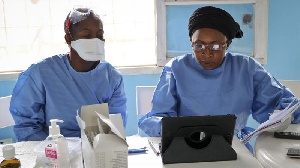By Dr. Michael J.K. Bokor
Wednesday, April 4, 2012
In this write-up, I isolate the country’s Ministry of Justice and Attorney-General’s Department for scrutiny. It is a major part of the problems confronting our legal and justice delivery system because its officials don’t perform their functions creditably. This Ministry should better be called a Ministry of Injustice and anything else that will paint the true picture of its incompetence.
Many negative events have occurred in this 4th Republic, especially to confirm the lousiness in that sector, which doesn’t bode well for our democracy. We see those negative events as either a deliberate attempt to frustrate justice delivery or to perpetrate injustice against people whose cases reach that Ministry.
Under Rawlings, we had cause to question the calibre of people working in that Ministry. Under Kufuor, the situation didn’t change for the better even after he had appointed three different people to head it. Under President Mills, the canker and rot in that Ministry has reached an alarming height even after three different appointees have been sent there at different times to work for the good of the people.
We don’t want to recollect the circumstances surrounding the loss of cases prosecuted by that Ministry but we take note of the fact that the Woyome scandal has opened the can of worms that that Ministry is.
It has exposed some clear instances of incompetence or complicity in wrong-doing. What led to Betty Mould-Iddrissu’s resignation from there and the appointment of Martin Amidu only for him to be kicked out to make room for Benjamin Kumbuor will for long be remembered as a major lapse in the Mills-led government’s performance in the workings of that Ministry.
Against all odds, Ebo Barton-Oduro (the Deputy Minister of Justice and Attorney-General) is still at post despite the aberrations. His unguarded public utterance that the government saw its case against Woyome as “bad” and, therefore, halted the prosecution is a reflection of the lousiness that I am complaining of. It enabled Mould-Iddrissu to facilitate Woyome scandal. That huge sum of money e paid to Woyome as a judgement debt belongs to the good people of Ghana.
The negative attitude of that Ministry goes beyond this instance of criminal incompetence. As if not properly trained to perform their functions, the State Attorneys (especially those based at the Ministry in Accra) don’t attend court to proceed with cases that they are prosecuting. And they often do so without informing the Bench, which jeopardizes the trial and frustrates the accused and their defence counsel.
They also frequently give lame excuses for not proceeding with cases being prosecuted, which often either leads to the needless remanding of accused people in prison custody or their acquittal for lack of prosecution. Several cases of this sort don’t create any good public image for that Ministry.
More troubling is the fact that their failure to conclude cases being tried results in accused people being remanded in custody for ages and forgotten about. The current exercise by some kind-hearted lawyers visiting the prisons to ensure that those being unduly remanded are given a hearing and their cases disposed of is the direct consequence of the hard-heartedness with which officials of that Ministry and their counterparts in the Police Service handle their tasks.
We are even not talking about the bribery and corruption that goes on there. Everybody who deals with that Ministry and its analogous institutions knows the behind-the-scenes manouevres by officials of that Ministry and the Police Service. It’s all about palm greasing before being helped. The mess is thick.
Additionally, dockets vanish, making the fate of suspects or accused people hang in the balance. In effect, our Ministry of Justice and the Attorney-General’s Department is highly notorious for its incompetence to which much of what hinders an expeditious trial of cases is attributable. Justice is not only delayed to those unfortunate victims caught in that web but it is also needlessly denied them, which makes me wonder whether this kind of sordidness will help our democracy mature at the level of justice delivery.
Of all the adversities that demoralize the people and provoke disaffection or apathy in them, none is worse than such lousiness that breeds injustice. Food insecurity and poverty may make them dejected and forlorn; but injustice kills everything in them. In our case, injustice and abuse of human rights persist.
How will the people be willing to contribute their quota to national development efforts if they know they will not benefit from it in the long run? Or that the democracy for which they are sacrificing their lot is skewed to benefit only a select few with political connections?
Dispense injustice to the people and they will have no compunction but to either sit on the fence or look for means to subvert that democracy.
A democracy that survives only because of the political ritual of voting to put greedy and power-drunk people in office is no democracy at all to enthuse over. Such seems to be our case, almost 20 years after establishing the 4th Republic.
Every democracy that is designed to endure provides opportunities for the people to feel fulfilled. A viable democracy must depend on the trust of the people whose sweat, blood, and toil feed it. It is a truism that democracy is expensive and can’t endure in an atmosphere of poverty, mismanagement, and outright injustice as is ours at this point, which is being operated in an opaque manner.
On the contrary, though, it is only when all that happens in the system can be seen through that the people will be inclined enough to continue sacrificing their lot to sustain that democracy. Ghanaians may be proud that they’ve chosen the right path toward political stability, economic prosperity, and national development, which may be the case on the surface; but deep down, it all seems to be fluffy high hopes that are more likely to burst into smithereens of disappointment than materialize to relieve the people of their age-old existential problems.
Those in the Ministry of Justice and the Attorney-General’s Department or elsewhere don’t do much to enhance justice delivery. That is why none is even thinking of prison reforms to make our prisons and other holding-places habitable. Such people forget that for as long as the law remains an ass, anybody can fall foul of it and be behind bars one day. If you doubt it, ask this “Jesus One Touch” preacher man who has just been released from prison and says that prison is worse than the hell that he preaches about!!
It is within this context that the statement made today by Miss Audrey Kokuvi Tay, a Circuit Court Judge hearing the case of Christian Asem Darkeh (the alleged importer of the MV Benjamin cocaine) is appropriate. She took issues with the attitude of the State Prosecutor handling that case and stressed the need for the human rights of accused people to be respected.
In fact, no statement could be more salutary than this one. It reinforces public complaints against the incompetence or sheer wickedness on the part of officials of that Ministry, which results in cases being protracted and accused people being kept on remand in deplorable conditions in police cells and prison custody for years without their cases ever being concluded. Such people are certainly being dehumanized which, I suppose, is the exact result expected by those officials whose laxity creates that situation.
And Mr. Heward-Mills, the defence counsel for Asem Darkeh, made it clear too when he said that since the case started, the prosecution had asked for many adjournments to complete investigations; yet, it had still not completed enquiries to be present in court.
Claiming to be investigating cases and, therefore, not proceeding with cases they hurriedly send to court is one of the virulent strategies used by officials of that Ministry to dehumanize people. If the cases haven’t been fully investigated to warrant prosecution, why rush to court only to dilly-dally with the case while the accused is subjected to all manner of callous treatment (by the police, the prison system, and what-not)?
It seems this approach to handling cases serves some people’s best interests and has been so since time-out-of-mind. But that is not what a democracy requires to be able to serve the people’s interests.
Unfortunately, some are of the mistaken belief that the more cases they dump at the courts, the more obvious it is that the Ministry is up-and-doing. That is why they will harden their hearts and subject others to this kind of inhuman treatment. How many times haven’t complainants turned into suspects or accused people to be unjustifiably prosecuted because someone in the corridors of power is wearing his authority on his sleeves?
We must not continue to have this kind of wicked aberrations that spawn miscarriage of justice. Of all the bad things that can happen to threaten our democracy, none equals the denial of justice and freedom to the people; and the problem reaches frightening heights if it is caused by the institutions of state that are supported by the sweat, blood, and toil of the people.
The Ministry of Justice and the Attorney-General’s Department is a perfect example of a bad institution in a democracy, and its officials must bow their heads in shame.
I am particularly incensed by the Ministry’s lousiness because it is part of the national malaise that nobody in authority seems to care about. All that happens there is just a replacement of one political appointee with another—a clear case of new wine being put into an old wine bottle to become contaminated as soon as the action is over.
Not until something drastic is done to streamline the justice delivery system, the loopholes in it that have been exploited over the years by unscrupulous elements with political connections will continue to hurt our democracy.
No matter who heads that Ministry, or how many times the President dismisses or appoints anybody to head it, nothing remarkable will come from there. The Ministry’s problems will continue to defy solution. More importantly, they will continue to ensure that those who have no political connections are either victimized or denied justice when caught in the maze of prosecution.
Not until the justice delivery system is revamped to weed out the undesirables and the bottlenecks eradicated, there is no way we can benefit from that Ministry as expected. And if we don’t benefit from it, we won’t work to sustain its activities. As is gradually emerging, we can foretell the danger that lies ahead of us as Election 2012 approaches and new problems add to existing ones.
• E-mail: mjbokor@yahoo.com
• Join me on Facebook at: http://www.facebook.com/mjkbokor
• Get a copy of my novel, The Last Laugh (PublishAmerica.com, April 2009)
• Coming out soon: The Story of the Elephant, a novel
Opinions of Thursday, 5 April 2012
Columnist: Bokor, Michael J. K.














